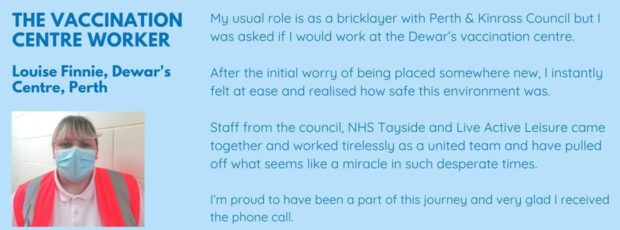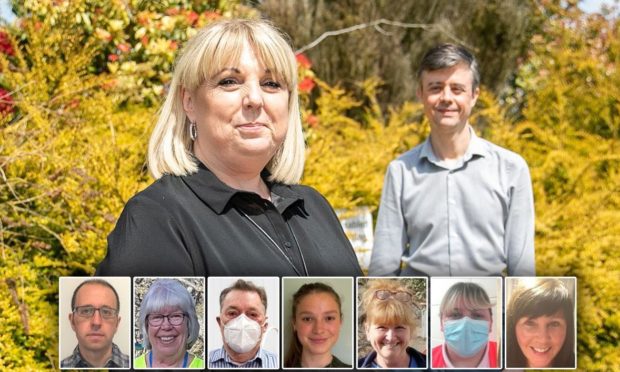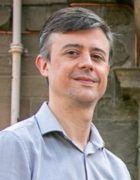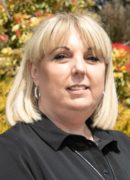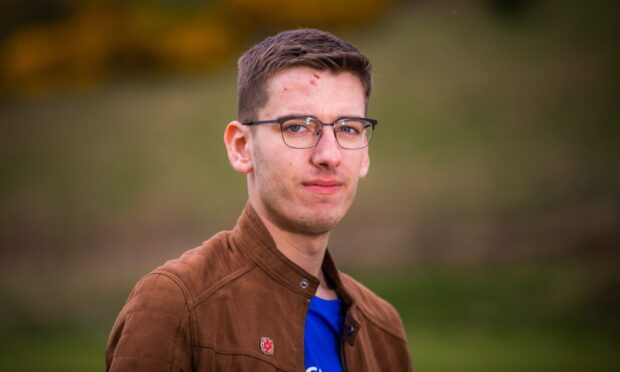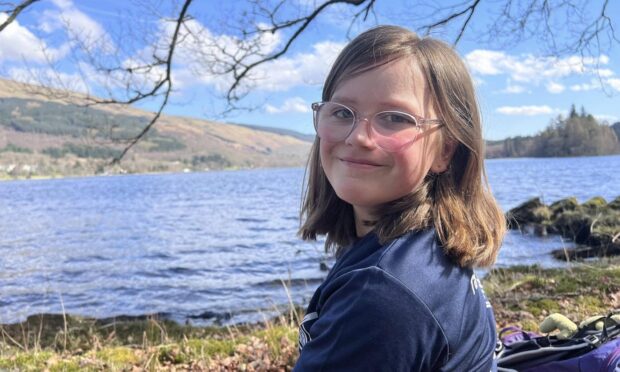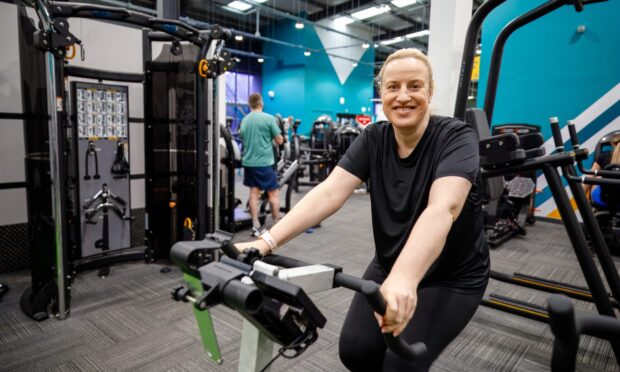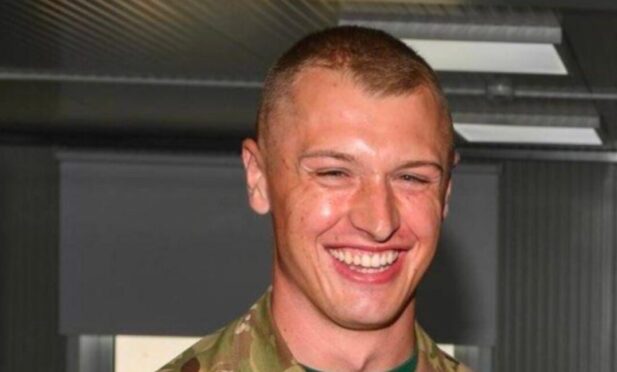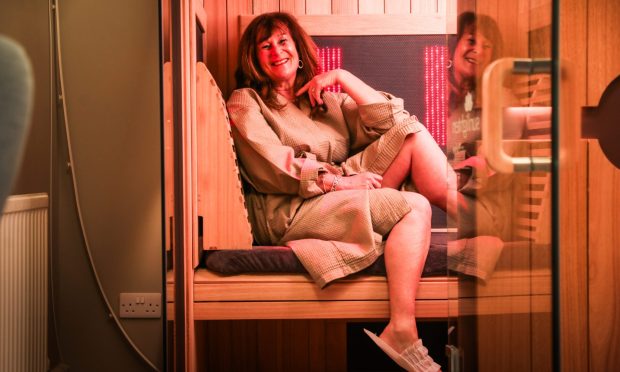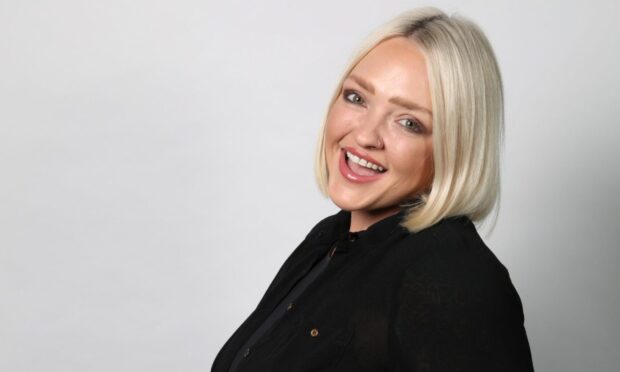They’ve reached the impressive milestone of vaccinating more than a quarter of a million people – 73% – across Tayside in just six months and public feedback on the efficient roll-out has been extremely positive.
Like so many working in healthcare, though, the team behind our area’s much-praised vaccination programme remain modest about their achievement.
As well as coordinating the “biggest logistical operation in peace time” – keeping our communities informed and safe – the team has found laughter, friendship and solace in a difficult year.
We discover:
-
What went on behind the scenes of the massive roll-out
-
The team’s highs and lows – professionally and personally
-
Their plans for a potential booster programme in autumn
“It’s a bit like an Oscar speech,” laughs Dr Daniel Chandler, associate director of public health for NHS Tayside, talking alongside vaccination programme director Lynne Hamilton.
“No matter how much you try to thank everyone, there are so many who have made it work, we’ll inevitably forget someone!
“Lynne deserves a lot of credit for the success. She has led lots of the innovations in Tayside: which venues we were able to deliver to; targeted vaccinations in certain settings, like those who need more support or seasonal workers on farms, factories etc.
“Other areas of Scotland are now following that to boost uptake.
“That helped us avoid some of the challenges happening elsewhere.
“We’ve had our moments but we’ve got around 100% uptake across all the cohorts we’ve targeted for completion.
“We have really good figures compared to other areas.
“It’s not a competition but we are really proud of the success. It is a team success.”
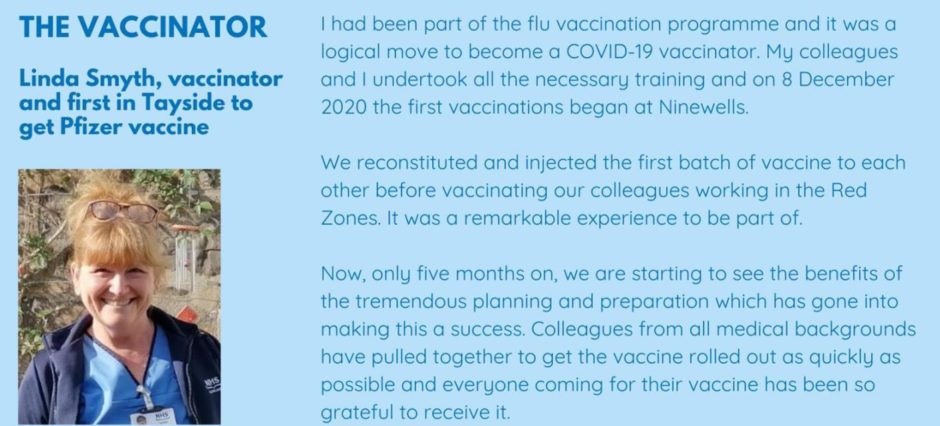
Lynne Hamilton recently received international recognition for her work on the vaccination programme.
She laughs when it’s suggested she’s a local hero: “Haha, I don’t know about that; it is all down to a huge, great team effort.
“There were lots of unsung heroes.
“From procurement teams who have the supplies to PPE equipment for people; screens for venues; local authorities admin staff from leisure services to help booking; IT; communications team; marshals from voluntary organisations.
“It wasn’t just the NHS workforce, it was all the people behind the scenes who worked really hard for success.”
Is this the biggest thing you’ve ever done?
Lynne: “Without doubt. Nobody envisaged this was going to come as quickly as it did.
“It was discussed as something in the future and then suddenly we had two weeks.
“As usual in Tayside, everyone pulls together. Everyone worked above and beyond to make it work. Not because they were asked to but because they wanted it to be a success.
“There was a lot of pressure for it to succeed too, because it was going to be the way out of this.”
Danny: “For anyone working in public health there hasn’t been anything like this. It was described as ‘the biggest instance of logistical mobilisation that the NHS or indeed Scotland has ever seen in peace time’.”
Was there a moment you realised how huge the task was?
Lynne: “I remember being in the office with the director of public health and thinking ‘Oh my goodness, what have we got coming at us!’
“But also thinking how exciting to be involved in something so important, so big and so new.
“It was quite humbling to be part of this. It was a huge opportunity in my career, which I will reflect on and which I will never have the chance, hopefully, to do again!”
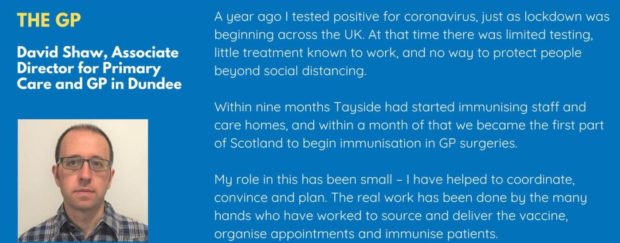
Lynne: “There were so many complexities with the vaccine type itself, the different fridge components, the cold chain around it and the supply issues, where we could provide it from legally and where we couldn’t.
“These things were unseen by the public.”
Were there NHS Tayside plans in place?
Danny: “In January and February of 2020 we were already watchful of what was happening across the world.
“PHS and other international bodies were highlighting projections of risk relationship for our part of the world. That instigated early meetings so we were thinking about it.
“But quite quickly it became clear we’d need a rapid emergency or major incident-type response that was going to be ongoing.
“Unlike Lynne, I’ve been involved in planning and coordinating vaccine programmes for a few years, since 2013 when I joined NHS Tayside.”
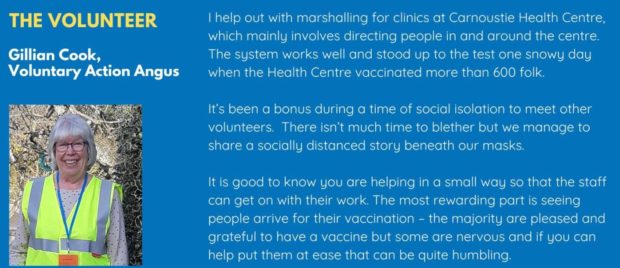
Danny: “Quite often vaccination is an area of work that happens in the background and tends to only get noticed if something isn’t going quite right; for example, rising cases of whooping cough or vaccine scares.
“But in Scotland, particularly Tayside, we have maintained a consistent level of uptake across all the routine programmes, so we felt we had a strong platform to build from.
“The difference with Covid is the degree of (and this is healthy) scrutiny, interest and focus from the public, elected members and our colleagues about how the programme was shaping up and how it was delivering.”
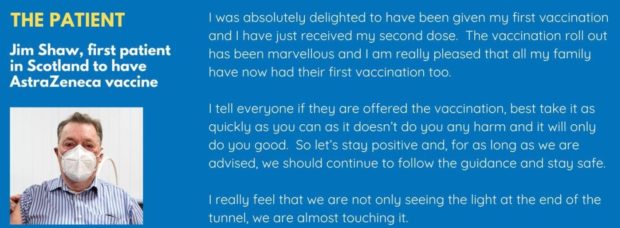
Danny: “It was an opportunity to shine but also to be clear on what our plan was and to take people with us.
What were the challenges you faced?
Lynne: “All through it we were thinking there may be a moment where it quietens down, where we can take a breath and take stock. But we’ve never really got there.
“We had to set up our own local booking system, tens of thousands of appointments in a week.
“I think every one of us got on the phones to invite people for their vaccine.
“Supply played a big part in terms of the ‘lumpiness’ of the delivery. You’d never deliver it like this usually but we couldn’t sit on stock and not have needles in people’s arms.
“We’ve gone with the supply all along so we’ve had to react, rather than have a smoothened process. There is lots of manoeuvring to change direction if we have to.
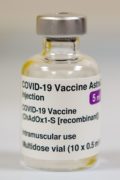
Danny: “We went from having no such thing as a vaccination service for adults or Covid to having 400-plus trained and active immunisers and support staff, pharmacy, drivers, logistics, all crucial to the delivery.
“There was mobilising staff, those doing additional hours, retired staff coming back in, managing the training and scheduling of staff and many other things.
“All that needed a workforce response to be flexible and adaptable.
“Response to shifts in the epidemic meant timing between doses was adjusted. And the instigating of major venues as vaccination centres and launching at a really fast pace was unprecedented.”
And the most positive things?
“A huge positive is how many people have come forward. We didn’t know what that would be like. It was humbling, hearing from people so eager to get their vaccine.
“There was a day where I was writing ‘in four months’ and realised we’d hit 200,000 doses in 16 weeks. The penny dropped a bit, the realisation of what we’d achieved.
“When you’re focused on planning it, you’re not really thinking about the achievement the teams have made. What they’ve done has been phenomenal.”
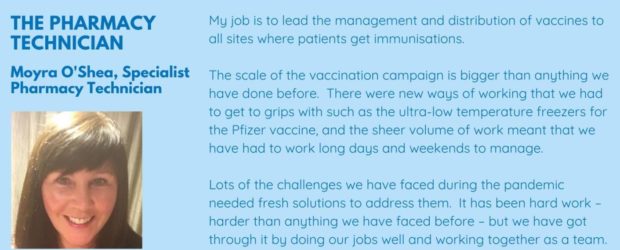
Danny: “An emotional moment was back in December when we set up our first clinic for health and social care workers and I went to meet the team and see the site.
“At the time that felt like an enormous undertaking, a massive mobilisation to get a new team, structure, clinic booking and scheduling system, reporting and governance.
“All the things that would usually take months or years in the NHS were done in a matter of weeks.”
Are you planning boosters in autumn?
Danny: “We are standing by and preparing for a potential booster programme.
“We are waiting for that advice from JCVI (Joint Committee on Vaccination and Immunisation).
“Government ministers will be looking at the latest evidence on the protection two doses offers.
“They will look at the evolving nature of the pandemic and any variants that might suggest vaccines being needed for part two of the programme.
“We don’t have a definitive answer yet about what that programme will be. We should get that over the summer. We’ll be ready, whatever we’re asked to do.”
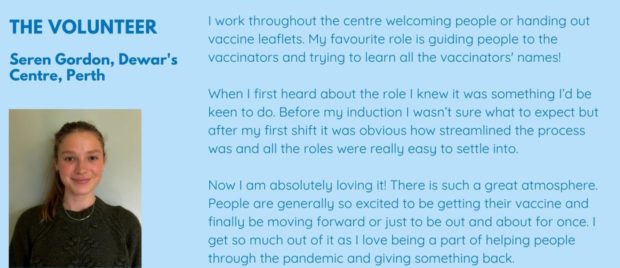
Danny: “The approach for this phase was: resource is no object, so we had whatever it took to achieve what we needed.
“We’re still in that phase but over time we will need to start taking stock.
“That will evolve and in September when, all being well, offering two doses to the adult population will be completed, we’ll be able to move towards more ‘business as usual’ and long-term view.”
How have you managed your own wellbeing and family life during the pandemic?
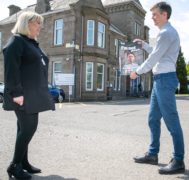 Lynne: “I won’t deny it has been challenging and we’ve all had down moments through exhaustion or pressure. But it has also been exhilarating.
Lynne: “I won’t deny it has been challenging and we’ve all had down moments through exhaustion or pressure. But it has also been exhilarating.
“One of the funny moments was a Saturday night when Danny and I we were on a Teams video call with others to the Scottish Government chief exec.
“We both had our children popping up on the screen, making faces in the background.
“It just summed up the whole thing. This was part of our lives, just like our children are. This was normal because they were part of this too.
“Our children have become friends from this.”
Danny: “A lot of the task was troubleshooting and fixing problems or responding to changes in direction.
“From not having worked together before, Lynne and I have become the closest of colleagues, the closest I’ve ever had despite most of our interactions being over Teams.
“All being well, our children will get together in person this weekend for the first time, which will be lovely.”
What will you do when this is over?
Lynne: “We’ve joked that we’ll all keep the Caird Hall on for a month after this is over, for a big party!”
More than 250,000 Taysiders would undoubtedly agree Lynne, Daniel and the team responsible for the massive task deserve it.
